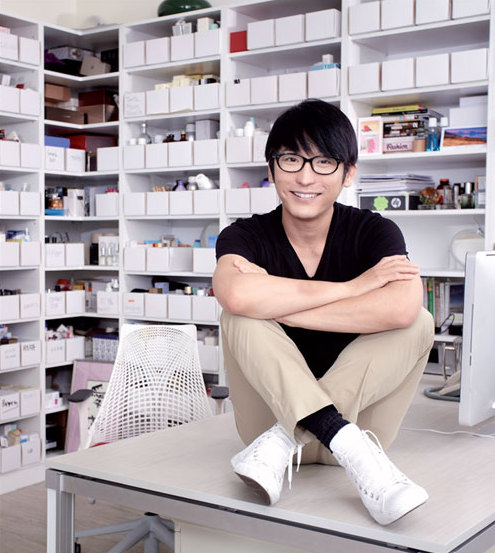

In recent years, China's cosmetics market has seen a rise in the number of homegrown brands developed by self-taught beauty experts.
Some of the most popular ones are Naruko by Niu Er, J Plus by Li Jing and Afrella by Nic Peng. These beauty gurus used to help customers make the right choices in an overcrowded cosmetics market.
Taiwan guru Niu Er is one of the first people to develop a personal beauty brand. His label Naruko now is a $10 million business, offering lotions, facial creams and serum products.
Niu first appeared on the scene in 2003 as a beauty consultant on a Taiwan TV show to teach women how to use cosmetics correctly.
After graduating from a medical college in Taipei, Niu happened to read a recruitment ad from Arwin Group, which specializes in beauty products. Joining The Body Shop in 1994 as a salesman, Niu officially started in the beauty business.
"When I was studying in college, a friend said to me jokingly: 'Look at your face! Your pores are so big that ants could live in them!' It was then I decided to learn about cosmetics," Niu says.
His interest in developing beauty products, however, did not begin until years later. Having worked for The Body Shop and Sisley, Niu was invited by a company to study some of the ingredients for creams.
"I gained experience in developing beauty products during this period. In 2009, finally, I created the Cream of Jingcheng. Then there was Naruko, and then there was Ampm," Niu says.
Naruko's products reflect what Niu learned from his experiences working for big labels. He uses sustainable elements from different plants and develops them for different purposes.
Niu's success story is similar to that of Beijing-based TV host Li Jing, who created J Plus.
As a TV celebrity, Li says she has to work under great pressure and has to look good while doing it. So on her talk show, she always recommended the beauty products she had found to her audience.
She decided to start her label J Plus at the end of 2009. The label is known for its 4-D facial mask, which "feels like you're wearing a plant mask when you apply it". Using her influence, Li promotes her brand on her talk show, emphasizing its natural elements. It has a strong fan base.
Nic Peng, also known as "Brother Nic", found fame with his blog ranking the top 100 skin creams. "It was a tough job, and I had to use 10 creams within one or two months," Peng says.
As part of this process, Peng reviewed the creams and expanded his portfolio by writing more stories with different angles. In July 2009, Peng launched his own label Afrella.
With so many labels in the Chinese market, why do consumers choose these labels? College student Wang Hongyi thinks she has the answer.
"Their products are not expensive, and they have a good reputation," Wang says.
She adds most of Naruko's products are priced at under 500 yuan ($80) - a very competitive price in the cosmetics market.
J Plus and Peng's products are priced no higher than 300 yuan.
"I hope my brand will become an international one in the future. There is so much space for homegrown beauty labels to grow," Niu says.
According to China Hairdressing and Beauty Association, local brands built by beauty gurus account for nearly 14 percent of the market.
"The strongest feature is the founder who creates this label. Usually, they attract consumers with good prices and, most importantly, their reputations," says beauty products analyst Zhang Yi.
DIY or gardening may prolong life
2013-12-20Amateurs shoot lunar photos using DIY telescope
2013-12-02Fresh off the grill: the best DIY barbecue spots in Guangzhou
2013-04-22Copyright ©1999-2018
Chinanews.com. All rights reserved.
Reproduction in whole or in part without permission is prohibited.